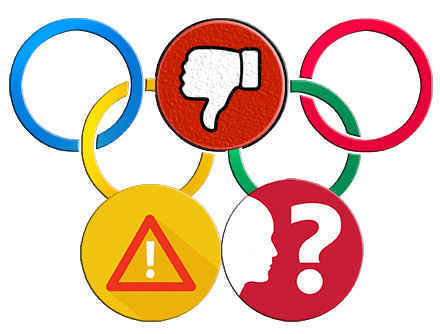10 reasons why the Olympics are bad

Reasons Why the Olympics Are Bad:
Financial Burden on Host Cities №1
Hosting the Olympics often results in massive financial burdens for the host cities and countries. The costs associated with building stadiums, infrastructure, and accommodations far exceed the initial estimates, leaving taxpayers to foot the bill long after the games have ended.
Displacement of Local Communities №2
The construction of Olympic venues frequently leads to the displacement of local communities, as homes and businesses are demolished to make way for stadiums and other facilities. This can disrupt the lives of residents and erode the social fabric of neighborhoods.
Environmental Impact №3
The construction and operation of Olympic venues can have significant environmental consequences, including deforestation, habitat destruction, and increased pollution. Hosting the Olympics often requires large amounts of energy and water, further exacerbating environmental issues.
Exploitation of Workers №4
In preparation for the Olympics, host cities may exploit workers, subjecting them to poor working conditions, low wages, and even forced labor. Construction projects are often rushed to meet tight deadlines, leading to safety hazards and accidents on-site.
Overshadowing Local Issues №5
The hype and spectacle of the Olympics can overshadow pressing local issues, diverting attention and resources away from important social, economic, and political challenges facing the host city and country.
Corruption and Bribery №6
The bidding process for hosting the Olympics is often rife with corruption and bribery, as cities and countries compete to win the opportunity to host the games. This can lead to unfair advantages for certain bidders and undermine the integrity of the selection process.
Legacy of Debt №7
Many host cities are left with a legacy of debt long after the Olympics have ended. The costs of maintaining and repurposing Olympic venues often far exceed their economic benefits, leaving cities struggling to recoup their investments.
Security Concerns №8
Hosting the Olympics presents significant security challenges, as large-scale events are potential targets for terrorism and other security threats. The need for heightened security measures can be disruptive and costly, putting a strain on local law enforcement agencies.
Commercialization and Sponsorship №9
The Olympics have become increasingly commercialized, with corporate sponsors wielding significant influence over the games. This can lead to excessive advertising, product placement, and the prioritization of profit over the spirit of sport.
Inequality and Exclusion №10
Despite efforts to promote inclusivity and diversity, the Olympics often perpetuate inequality, particularly in terms of access to resources and opportunities for participation. Many athletes from developing countries struggle to compete on a level playing field due to financial constraints and lack of support.
What Can Be Done?

- Implementing stricter regulations and oversight to combat corruption in the bidding process.
- Prioritizing sustainability and environmental responsibility in the planning and execution of the Olympics.
- Ensuring fair wages, safe working conditions, and labor rights for all workers involved in Olympic-related projects.
- Investing in long-term legacy projects that benefit local communities beyond the duration of the games.
- Increasing transparency and accountability in the allocation of funds and resources for the Olympics.
Interesting Facts About the Olympics

Here are some fascinating insights into the Olympics:
- Ancient Origins
The roots of the Olympics trace back to ancient Greece, where the games were held in Olympia from as early as 776 BC to 393 AD. Dedicated to the Olympian gods, these ancient spectacles showcased a variety of events including running, wrestling, and chariot racing, embodying the spirit of athleticism and competition.
- Modern Revival
The modern Olympic Games were resurrected in 1896 by French educator Baron Pierre de Coubertin. Athens, Greece, served as the stage for this grand resurgence, welcoming 241 athletes from 14 nations to compete in 43 events. This revival marked the beginning of a global celebration of sport, culture, and unity.
- Symbolism of the Rings
The iconic Olympic rings symbolize the interconnectedness of the five continents—Africa, the Americas, Asia, Europe, and Oceania—in a spirit of friendship and harmony. Each ring’s color—blue, yellow, black, green, and red—along with the white background, represents the colors found in every nation’s flag, emphasizing the universality of the Olympic movement.
- The Torch Relay
A tradition ignited during the 1936 Berlin Olympics, the Olympic torch relay sees a flame journey from Olympia, Greece, to the host city, symbolizing purity and the enduring legacy of the ancient Games. This ceremonial journey captivates hearts worldwide as it passes through diverse landscapes and cultures, uniting people in anticipation of the upcoming festivities.
- Interlacing Rings
During the Opening Ceremony, the symbolic forging of the five Olympic rings represents the fusion of the world’s continents and the convergence of athletes from across the globe. This captivating moment encapsulates the essence of the Olympic spirit—unity, diversity, and the pursuit of excellence.
- Participation of Women
The 1900 Paris Olympics marked a pivotal moment as women competed for the first time in Olympic history, showcasing their athletic prowess in events – example: tennis, golf, sailing, and croquet. Since then, the inclusion of women in the Games has steadily increased, with gender parity becoming a hallmark of modern Olympic competition.
- Host City Selection
The selection of the host city for the Olympic Games is a highly anticipated event, managed by the International Olympic Committee (IOC) through a rigorous bidding process. Cities vying for the honor submit comprehensive bids outlining their plans for venues, infrastructure, and lasting legacies. The final decision rests with the IOC, determined through a vote by its esteemed members.
- Winter Olympics
The Winter Olympic Games debuted in 1924 in Chamonix, France, initially known as the “International Winter Sports Week.” From figure skating and ice hockey to skiing and snowboarding, the Winter Olympics have evolved to encompass a diverse array of cold-weather sports, captivating audiences with thrilling displays of athleticism and skill.
- Paralympic Games
Following the success of the Stoke Mandeville Games organized by Dr. Ludwig Guttmann in England, the Paralympic Games emerged in 1960 in Rome, Italy, providing a platform for athletes with physical disabilities to showcase their talents on the international stage. Since then, the Paralympics have grown into a prestigious multi-sport event, held in conjunction with the Olympics, promoting inclusivity, equality, and the power of human determination.
- Economic Impact
While hosting the Olympics promises economic benefits – example: increased tourism and infrastructural development, it also presents significant financial challenges. Many host cities grapple with mounting costs and debt long after the games conclude, sparking debates about the long-term viability and sustainability of hosting such mega-events.












